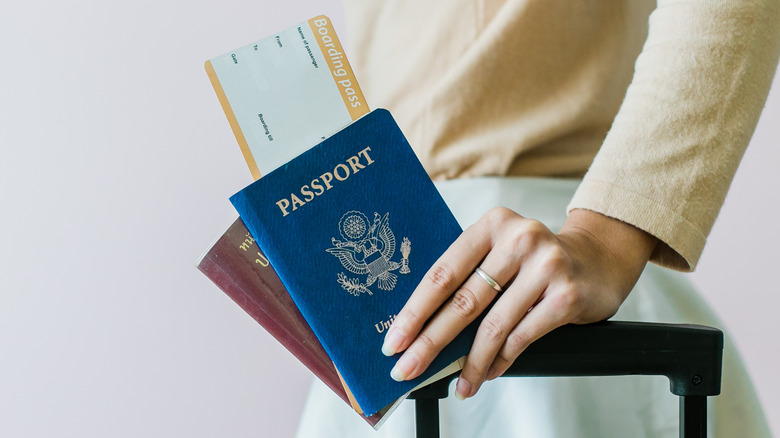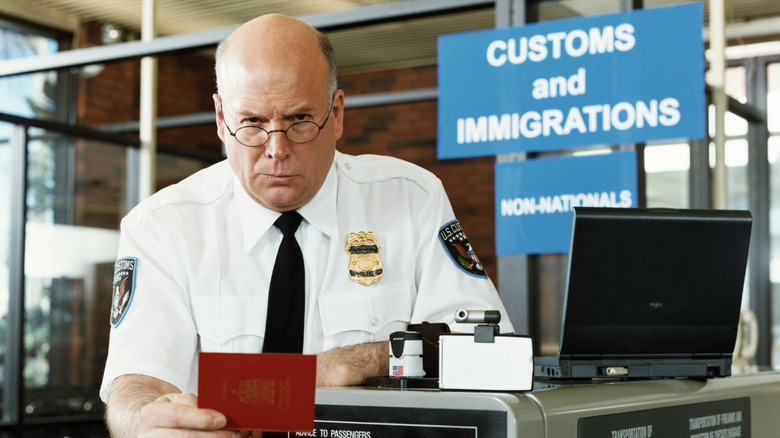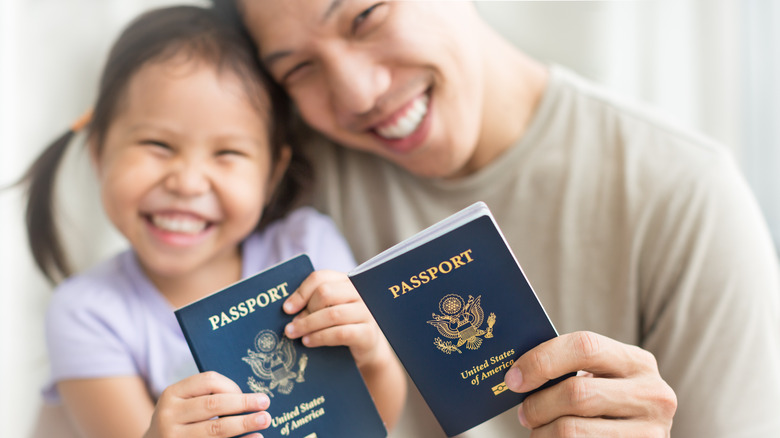Why You Shouldn't Fly With A Damaged Passport
A traveler's passport is their green light to adventure beyond borders. Whether you're traveling for work or in the name of relaxation, a passport is essential to have in hand. For such a small identifying document, a passport holds a massive amount of international power.
The International Civil Aviation Organization is responsible for determining the size requirements and acceptable standards of a passport to national governments. The United States follows these standards and issues travelers passport books with dimensions that measure just 4.921 inches by 3.465 inches. Beyond size standards, passports are also subjected to a variety of other strict regulations including the size of photos, how visas are applied, completed signature lines, issue dates, expiration dates, and more.
In addition to these numerous regulations, passports are designed to be durable. It's expected that they'll be passed between border control officers, stuffed into luggage, and moved from one hotel safe to another. While they're certainly tough, passports aren't entirely immune to wear and tear over time. Trying to travel with a damaged passport can cause all kinds of problems for travelers.
Rules around what constitutes a damaged passport are extremely specific. They also fluctuate from country to country. If not adhered to, these regulations around what defines a damaged passport can prevent travelers from journeying beyond their country's borders at all. This is one of several reasons it's worth a traveler's while to get a new passport before attempting to travel if any damage is suspected.
The consequences of passport damage can be serious
There are plenty of scenarios in which a traveler might find themselves with a damaged passport. Sometimes, it's damage to the document that's simply overlooked by frequent flyers who are in the habit of grabbing their passport and heading to the airport without a second glance. Other times, the damage may seem so minor that a traveler just assumes it will be overlooked by border agents. Either way, traveling with a damaged passport can be devastating to those caught unaware of the potential consequences.
Every country maintains its own regulations around what constitutes damage to a passport that deems the document invalid for travel. A passport that's accepted with minor damage in one country could be immediately rejected in another. In Thailand, for example, there have been reports of incidents where foreign travelers have been detained for days at a time upon arrival for having pages missing or torn from their passports. Similar incidents are reported in Bali, where foreign travelers have been detained as a result of water damage noted on the pages of their passports.
Being detained abroad can be a traumatic experience for any traveler. There's also the possibility that detention turns into an automatic return to your home country on the next available flight. This can be extremely disappointing to those who have long been planning a trip abroad and have invested significantly in the experience.
Replace a damaged passport as soon as possible
The definition of a damaged passport is subjective (whether you have one passport or you're a dual citizen). In light of this, it's always better to err on the side of caution. If you notice any damage to your document, it's worth replacing before traveling. The U.S. guidelines for what constitutes a damaged passport are a helpful place to begin.
The U.S. Department of State requires citizens to replace their passports when significant damage occurs to the personal data and photo page or the book cover. Damage points that are identified as problematic and require replacement include page tears, missing visa pages, hole punches, water damage, and any unofficial markings on the personal data page.
Other notable damages to keep an eye on include loose or frayed passport bindings. Since 2007, U.S. passports have been produced with radio frequency identity chips that are used for safeguarding personal contact information. Travelers who notice any damage to the chip will want to be sure to replace their passports before traveling as well.
Ultimately, the rules and regulations around passport validity are designed with safety in mind. Border agents in every country need to ensure foreign passports haven't been purposefully altered. Taking time to look your passport over before heading out on an international adventure is always advisable. The time it takes to replace a damaged passport is often worth the effort compared to a possible detainment or even deportation abroad.


